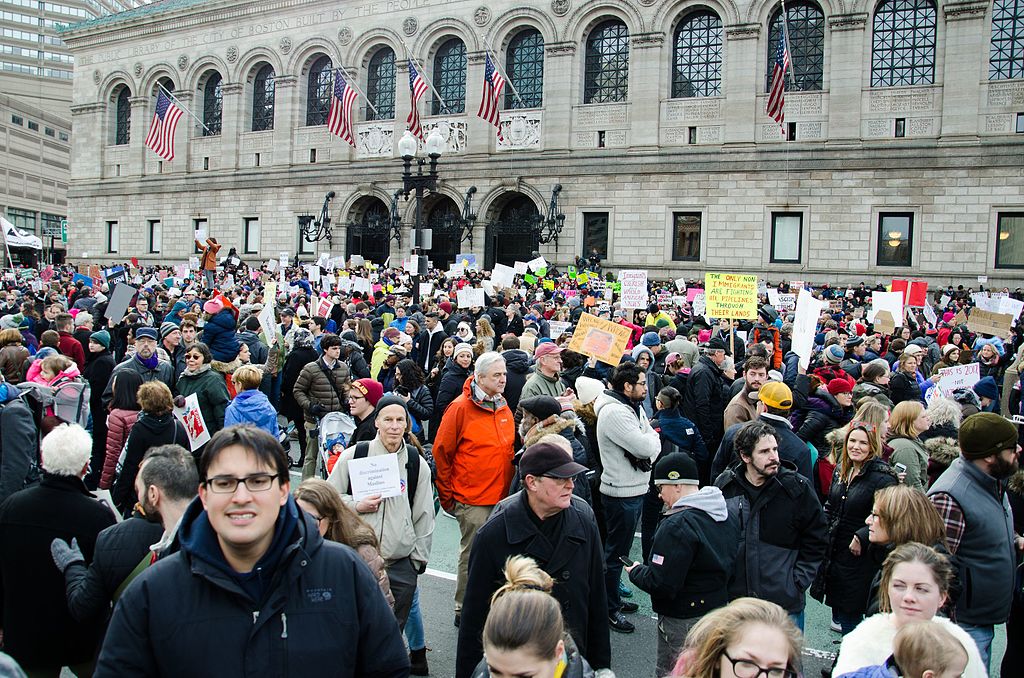Thousands gathered in Berlin on Sunday to oppose a controversial immigration bill backed by opposition conservatives and the far-right Alternative for Germany (AfD). The proposal, led by Friedrich Merz of the CDU/CSU, faced backlash for breaking a long-standing political taboo against working with AfD.
An estimated 160,000 protesters rallied at Brandenburg Gate near the Bundestag, holding signs that read, "We are the firewall, no cooperation with the AfD" and "Merz, go home, shame on you!" Demonstrations also took place in Hamburg, Stuttgart, and Leipzig.
Merz, a frontrunner for Germany’s chancellorship in the upcoming February election, failed to push the bill through parliament as members of his own party refused to support it. His attempt to align with AfD dealt a blow to his leadership, with critics warning that the move risked legitimizing the far-right.
The proposed law sought to restrict family reunifications for refugees and tighten border control. Supporters cited rising concerns over public safety following high-profile attacks involving individuals with immigrant backgrounds. However, Chancellor Olaf Scholz’s Social Democrats (SPD) and the Greens rejected the bill, arguing it violated European law and would not have prevented such incidents.
AfD, currently under surveillance by German security services, has long been isolated by mainstream parties to prevent its legislative influence. Public opinion remains divided, with polls showing two-thirds of Germans favor stricter immigration policies.
The protests signal growing resistance to conservative-led immigration restrictions, with many citizens viewing them as an erosion of democratic values. As the national election approaches, the debate over immigration and political alliances is set to shape Germany’s political landscape.



 Newly Released DOJ Epstein Files Expose High-Profile Connections Across Politics and Business
Newly Released DOJ Epstein Files Expose High-Profile Connections Across Politics and Business  South Korea Assures U.S. on Trade Deal Commitments Amid Tariff Concerns
South Korea Assures U.S. on Trade Deal Commitments Amid Tariff Concerns  U.S. Sanctions on Russia Could Expand as Ukraine Peace Talks Continue, Says Treasury Secretary Bessent
U.S. Sanctions on Russia Could Expand as Ukraine Peace Talks Continue, Says Treasury Secretary Bessent  Norway Opens Corruption Probe Into Former PM and Nobel Committee Chair Thorbjoern Jagland Over Epstein Links
Norway Opens Corruption Probe Into Former PM and Nobel Committee Chair Thorbjoern Jagland Over Epstein Links  Supreme Court Signals Doubts Over Trump’s Bid to Fire Fed Governor Lisa Cook
Supreme Court Signals Doubts Over Trump’s Bid to Fire Fed Governor Lisa Cook  Federal Judge Signals Possible Dismissal of xAI Lawsuit Against OpenAI
Federal Judge Signals Possible Dismissal of xAI Lawsuit Against OpenAI  Federal Reserve Faces Subpoena Delay Amid Investigation Into Chair Jerome Powell
Federal Reserve Faces Subpoena Delay Amid Investigation Into Chair Jerome Powell  Trump Signs Executive Order Threatening 25% Tariffs on Countries Trading With Iran
Trump Signs Executive Order Threatening 25% Tariffs on Countries Trading With Iran  Uber Ordered to Pay $8.5 Million in Bellwether Sexual Assault Lawsuit
Uber Ordered to Pay $8.5 Million in Bellwether Sexual Assault Lawsuit  CK Hutchison Unit Launches Arbitration Against Panama Over Port Concessions Ruling
CK Hutchison Unit Launches Arbitration Against Panama Over Port Concessions Ruling  TrumpRx.gov Highlights GLP-1 Drug Discounts but Offers Limited Savings for Most Americans
TrumpRx.gov Highlights GLP-1 Drug Discounts but Offers Limited Savings for Most Americans  Minnesota Judge Rejects Bid to Halt Trump Immigration Enforcement in Minneapolis
Minnesota Judge Rejects Bid to Halt Trump Immigration Enforcement in Minneapolis  New York Legalizes Medical Aid in Dying for Terminally Ill Patients
New York Legalizes Medical Aid in Dying for Terminally Ill Patients  Trump Family Files $10 Billion Lawsuit Over IRS Tax Disclosure
Trump Family Files $10 Billion Lawsuit Over IRS Tax Disclosure  California Sues Trump Administration Over Federal Authority on Sable Offshore Pipelines
California Sues Trump Administration Over Federal Authority on Sable Offshore Pipelines  New York Judge Orders Redrawing of GOP-Held Congressional District
New York Judge Orders Redrawing of GOP-Held Congressional District  Panama Supreme Court Voids Hong Kong Firm’s Panama Canal Port Contracts Over Constitutional Violations
Panama Supreme Court Voids Hong Kong Firm’s Panama Canal Port Contracts Over Constitutional Violations 





























